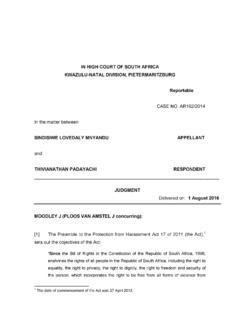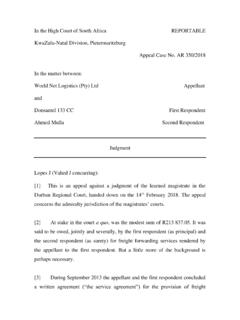Transcription of Superior Courts Act - Justice/Home
1 Please note that most Acts are published in English and another south African official language. Currently we only have capacity to publish the English versions. This means that this document will only contain even numbered pages as the other language is printed on uneven numbered pages. Government Gazette REPUBLIC OF south africa Vol. 578 Cape Town 12 August 2013No. 36743 THE PRESIDENCY No. 615 12 August 2013 It is hereby notified that the President has assented to the following Act, which is hereby published for general information: Act No.
2 10 of 2013: Superior Courts Act, 2013 AIDS HELPLINE: 0800-123-22 Prevention is the cure 2No. 36743 GOVERNMENT GAZETTE, 12 August 2013 Act No. 10 of 2013 Superior Courts Act, 2013 GENERAL EXPLANATORY NOTE:[]Words in bold type in square brackets indicate omissions fromexisting underlined with a solid line indicate insertions inexisting rationalise, consolidate and amend the laws relating to the ConstitutionalCourt, the Supreme court of Appeal and the high court of south africa ; to makeprovision for the administration of the judicial functions of all Courts ; to makeprovision for administrative and budgetary matters relating to the SuperiorCourts; and to provide for matters incidental THAT section 1 of the Constitution of the Republic of south africa , 1996,provides that the supremacy of the Constitution and the rule of law form part of thefounding values of the Republic;ANDsection 165 of the Constitution provides that (a)the judicial authority of the Republic is vested in the Courts ;(b)the Courts are independent and subject only to the Constitution and the law,which they must apply impartially and without fear, favour or prejudice;(c)no person or organ of state may interfere with the functioning of the Courts .
3 (d)organs of state, through legislative and other measures, must assist and protectthe Courts to ensure the independence, impartiality, dignity, accessibility andeffectiveness of the Courts ;(e)an order or decision by a court binds all persons to whom and all organs ofstate to which it applies; and(f)the Chief Justice is the head of the judiciary and exercises responsibility overthe establishment and monitoring of norms and standards for the exercise ofthe judicial functions of all Courts ;ANDsection 166 of the Constitution provides that the Courts are (a)the Constitutional court ;(b)the Supreme court of Appeal;(c)the high court of south africa ;(d)the Magistrates Courts ; and(e)any other court established or recognised in terms of an Act of Parliament,including any court of a status similar to either the high court or theMagistrates Courts ;ANDsection 171 of the Constitution provides that all Courts function in terms ofnational legislation, and their rules and procedures must be provided for in terms ofnational legislation;(English text signed by the President)(Assented to 12 August 2013)4No.
4 36743 GOVERNMENT GAZETTE, 12 August 2013 Act No. 10 of 2013 Superior Courts Act, 2013 ANDsection 180 of the Constitution provides that national legislation may provide forany matter concerning the administration of justice that is not dealt with in theConstitution;ANDitem 16(6)(a) of Schedule 6 to the Constitution provides that as soon as practicalafter the Constitution took effect all Courts , including their structure, composition,functioning and jurisdiction, and all relevant legislation, must be rationalised with aview to establishing a judicial system suited to the requirements of the Constitution;NOTING FURTHER that, with the advent of the democratic constitutional dispensa-tion in 1994, the Republic inherited a fragmented court structure and infrastructurewhich were largely derived from our colonial history and were subsequently furtherstructured to serve the segregation objectives of the apartheid dispensation;ANDthat, before the advent of the democratic constitutional dispensation in 1994, theMagistrates Courts were not constitutionally recognised as part of the judicial authorityand were largely dealt with as an extension of the public service.
5 ANDthat, since the Constitution provides that the judicial authority is vested in all thecourts, it is desirable to provide for a uniform framework for judicial management, bythe judiciary, of the judicial functions of all Courts ;AND RECOGNISING that the rationalisation envisaged by item 16(6)(a) of Schedule6 to the Constitution is an on-going process that is likely to result in further legislativeand other measures in order to establish a judicial system suited to the requirements ofthe Constitution,PARLIAMENT of the Republic of south africa enacts, as follows: CHAPTER 1 Introductory this Act, unless the context otherwise indicates appeal in Chapter 5, does not include an appeal in a matter regulated in terms ofthe Criminal Procedure Act, 1977 (Act No.)
6 51 of 1977), or in terms of any othercriminal procedural law; business day means a day that is not a public holiday, Saturday or Sunday; Constitution means the Constitution of the Republic of south africa , 1996; Department means the Department responsible for the administration ofjustice; Director-General means the Director-General of the Department; Division means any Division of the high court ; full court , in relation to any Division, means a court consisting of three judges; head of court , in relation to (i) the Constitutional court , means the Chief Justice;(ii) the Supreme court of Appeal, means the President of that court ;(iii) any Division of the high court , means the Judge President of that Division;and(iv) any court of a status similar to the high court , the most senior judge of suchcourt; high court means the high court of south africa referred to in section 6(1); judicial officer means any person referred to in section 174(1) of theConstitution;45101520256No.
7 36743 GOVERNMENT GAZETTE, 12 August 2013 Act No. 10 of 2013 Superior Courts Act, 2013 Judicial Service Commission means the Judicial Service Commission referredto in section 178 of the Constitution; Magistrates court means any court established in terms of section 2 of theMagistrates Courts Act, 1944 (Act No. 32 of 1944); Minister means the Cabinet member responsible for the administration of justice; plaintiff includes any applicant or other party who seeks relief in civil proceedings; prescribed means prescribed by regulation made in terms of this Act; President means the President of the Republic of south africa ; registrar means the registrar of the Constitutional court , the Supreme court ofAppeal or any Division of the high court , as the case may be, and includes anassistant registrar; rules means the applicable rules of court ; Rules Board means the Rules Board for Courts of Law, established by the RulesBoard for Courts of Law Act, 1985 (Act No.)
8 107 of 1985); Secretary-General means the head of the Office of the Chief Justice, referred to inColumn 2 of Schedule 1 to the Public Service Act, 1994 (Proclamation No. 103 of1994); Superior court means the Constitutional court , the Supreme court ofAppeal, theHigh court and any court of a status similar to the high court ; this Act includes any and interpretation of Act2.(1) The objects of this Act are (a)to consolidate and rationalise the laws pertaining to Superior Courts ascontemplated in item 16(6) of Schedule 6 to the Constitution;(b)to bring the structure of the Superior Courts in line with the provisions ofChapter 8 and the transformation imperatives of the Constitution; and(c)to make provision for the administration of the judicial functions of all Courts ,including governance issues, over which the Chief Justice exercises respon-sibility.
9 (2) This Act must be read in conjunction with Chapter 8 of the Constitution, whichcontains the founding provisions for the structure and jurisdiction of the SuperiorCourts, the appointment of judges of the Superior Courts and matters related to theSuperior Courts .(3) The provisions of thisAct relating to Superior Courts other than the ConstitutionalCourt, the Supreme court of Appeal or the high court of south africa , arecomplementary to any specific legislation pertaining to such Courts , but in the event ofa conflict between this Act and such legislation, such legislation must of legislation dealing with court Minister must be consulted prior to the introduction in Parliament, by a personother than the Minister, of any bill (a)providing for the establishment of any court of law;(b)providing for the establishment of any tribunal contemplated in section 34 ofthe Constitution.
10 (c)that amends the structure or functions of any court of law or tribunal referredto in paragraph(a)or(b);or(d)that assigns functions to judicial officers, other than in terms of this 2 Constitutional court , Supreme court of Appeal and high court of south AfricaConstitution and seat of Constitutional Court4.(1)(a)The Constitutional court consists of the Chief Justice of south africa , theDeputy Chief Justice of south africa and nine other judges of the Constitutional court .(b)The seat of the Constitutional court is in Johannesburg, but whenever it appearsto the Chief Justice that it is expedient or in the interests of justice to hold its sitting forthe hearing of any matter at a place elsewhere than at the seat of the court , it may holdsuch sitting at that 36743 GOVERNMENT GAZETTE, 12 August 2013 Act No.











